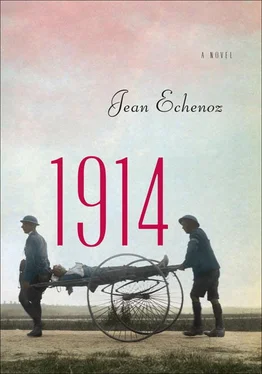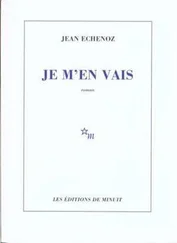In the minutes that follow, without losing sight of each other, the Aviatik and the Farman will fly over, pass, avoid, and close in on each other almost to the point of touching, a dry run of what will become the main maneuvers of aerobatics—loop, roll, spin, humpty-bump, Immelmann—with each plane looking to feint while at the same time seeking the best angle of attack to achieve a ballistic advantage. Charles is crouched in his seat, both hands on the pistol grip to steady his gun, unlike the enemy observer, who constantly reorients the barrel of his rifle. When Noblès suddenly sends his plane climbing into the sky, the Aviatik keeps close on his tail, slipping suddenly under him to climb again abruptly while turning, thus targeting the Farman while hiding the Aviatik from Charles behind his own pilot, leaving him helpless. A single shot then sounds from the artillery rifle: a bullet travels 40 feet through the air at 3,280 feet per second at an altitude of 2,300 feet to enter the left eye of Noblès and exit above his nape, behind his right ear and then the Farman, now beyond his control, remains for a moment on its flight path before heading down at an increasingly steep angle as Charles, gaping over Alfred’s slumped shoulder, sees the ground on which he will crash approaching at tip-top speed, offering not a hint of hope for any alternative save his imminent and permanent death—ground currently occupied by Jonchery-sur-Vesle, a pretty village in the Champagne-Ardenne region, and whose inhabitants are called Joncaviduliens.
WHEN THE RAIN BEGAN, the knapsack almost doubled in weight and there was a mass uprising of stormy wind so deeply frozen that the men wondered how it could even blow: it was perishingly cold when they reached the Belgian border where the customs officials, on the day of the mobilization, had lighted a great bonfire they’d kept going ever since, and around which the troop tried to huddle tightly in an effort to get some sleep. Anthime envied those customs fellows, the tranquil life he assumed they led, their jobs he was sure were safe, and their sheepskin sleeping bags. He envied them again and even more after leaving the village, another two days of marching later when he began to hear the big guns, closer and closer, a basso continuo accompanied by scattered shooting that probably meant skirmishes between patrols.
It was shortly after encountering this battlefront echo that the troop was suddenly sent right into the line of fire, in some foothills a little beyond the Belgian village of Maissin. Now there was no other option: that’s when they really understood they had to fight, had to go into battle for the first time, but until a shell actually landed near him, Anthime had not truly believed it. Once compelled to believe it, he discovered that everything he carried had grown heavier: knapsack, weapons, even the signet ring on his little finger, which was now deadweight and had no power to prevent the return, more painful than ever, of the ache in his wrist.
Then orders were shouted for them to advance. Essentially pushed forward by the others, he wound up without much knowing what to do in the middle of a battlefield that couldn’t have been more real. He and Bossis looked at each other; behind them Arcenel was adjusting a strap, and Padioleau was blowing his nose, but his face had turned whiter than his hankie. At that point, there was nothing for it, they had to advance on the double while behind them, a group of about twenty men gathered in a circle as calmly as you please without seeming to take any notice of the shelling. It was the regimental band, whose conductor, white baton in hand, brought it down to conjure up “La Marseillaise,” aiming to provide valiant commentary on the assault. The enemy had taken up strong defensive positions concealed in a wood, so the men had trouble advancing at first, but when the artillery behind the troop joined the fray to weaken the foe the men tried again to attack, running clumsily hunched over, hampered by their impedimenta, each man leading with his bayonet and spearing the frozen air before him.
As it happened they charged too soon, compounding the error by massing on the road that ran through the combat theater. Open and thoroughly familiar to the enemy artillery set up behind the trees, this road was in fact a perfectly clear target, and right away a few men not far from Anthime set about falling. He thought he saw two or three great spurts of blood but shoved them vigorously out of his mind, not being even certain, not having had time to be certain, that it was blood under arterial pressure—or even that he’d ever really seen blood until then, at least not in that way or that form. Besides his mind wasn’t in good shape for thinking, only for trying to shoot at whatever seemed hostile and above all for hunting down some possible cover wherever it might be. Luckily, although the road immediately received a proper drubbing from enemy fire, it did have low-lying areas here and there where the men had at first been able to seek shelter for a short while.
But for too short a while: barked orders prodded the first lines of infantry off the road and into the oat field alongside it where they were clearly at risk and now, not content with taking fire from the enemy, the men began receiving it as well in the back from the imprudent shooting of their own forces, after which disorder spread swiftly through the ranks. The thing is, they were green troops, and the foul-ups were just beginning; only later would the men be ordered to sew a large white rectangular patch on the backs of their greatcoats, to make them more visible to the observing officers and minimize such blunders. Meanwhile, as the band played its part in the engagement, the baritone sax was shot in the arm and the trombone fell gravely wounded; the group closed ranks and although their circle was reduced, kept playing without missing a note and then, when they began to reprise the measure in which “the bloody standard is raised,” the flute and tenor sax fell down dead.
The artillery having come to the company’s aid too late in their advance, the troop had been unable to gain the advantage all day, constantly moving forward only to retreat right away. Finally, at dusk, with a last effort they managed to drive the enemy back beyond the woods with a bayonet charge: Anthime saw—thought he saw—men stabbing other men right before his eyes, then firing their weapons to retrieve the blades from the flesh via the recoil. Clutching his rifle, he himself now felt ready to stab, impale, transfix the slightest obstacle, the bodies of men, of animals, tree trunks, whatever might present itself: a fleeting state of mind yet absolute, blind, excluding all others, but in the event the opportunity never arose. He continued to advance with all the others, laboriously, without lingering over the details, but the ground thus gained did not remain that way for long: the company had to withdraw almost immediately, since their position was not tenable without reinforcements that did not arrive. All this Anthime put together only later, when it was explained to him, for at the time he hadn’t understood a thing, which is par for the course.
So this was the first taste of combat for him and the others, at the end of which Captain Vayssière, an adjutant, and two quartermaster sergeants were found among the few dozen dead, not to mention the wounded, hastily removed by stretcher bearers just after nightfall. The band had suffered further casualties: one of the clarinetists had been gutshot, the bass drummer and his instrument had been sent tumbling by a bullet through his cheek, and the second flutist had lost half a hand. Picking himself up again when it was all over, Anthime noticed that his mess tin and stewpot had been shot through, and his kepi as well. Shrapnel had torn away the entire bottom of Arcenel’s knapsack, in what remained of which he’d found a projectile that had ripped his jacket on the way in. After roll call it turned out that the company was missing seventy-six men.
Читать дальше









